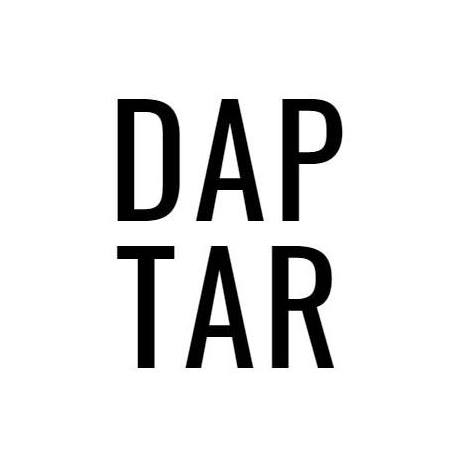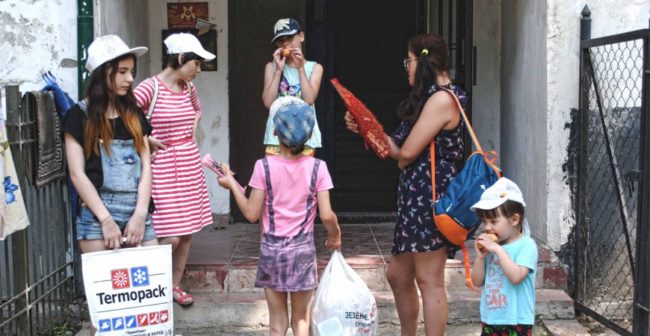
 When Leyla decided to foster four sisters from a shelter in the southeastern Russian city of Samara, she rented a flat with four rooms so there was enough space for everyone. The family is living here temporarily, in a normal apartment in a five-storey building in Daghestan’s capital, Makhachkala. You can easily tell it’s temporary, as there are huge bags piled up in one of the rooms. Everyone has their own bag. They serve as both wardrobe and nightstand — everything is in them.
When Leyla decided to foster four sisters from a shelter in the southeastern Russian city of Samara, she rented a flat with four rooms so there was enough space for everyone. The family is living here temporarily, in a normal apartment in a five-storey building in Daghestan’s capital, Makhachkala. You can easily tell it’s temporary, as there are huge bags piled up in one of the rooms. Everyone has their own bag. They serve as both wardrobe and nightstand — everything is in them.
‘I am afraid I won’t be able to love a foster child’
Shakhri is twelve and is Leyla’s only biological daughter; she says her dream has come true.
‘I always dreamed of having an elder sister. Marina is also older than me, but she is like a child. I would prefer her to be older intellectually.’
Leyla took in 14-year-old Marina, who is developmentally disabled, back in 2015. She does not seem to have realised yet that there has been a significant new addition in the family, that’s why she sometimes simply observes when the older siblings argue about something. But she willingly plays with her new younger sisters. Sometimes she looks after the youngest, four-year-old Adelina.
‘Imagine, what it’s like for me’, 15-year-old Elya, one of the four sisters Leyla recently adopted complains., and I am the eldest one.’
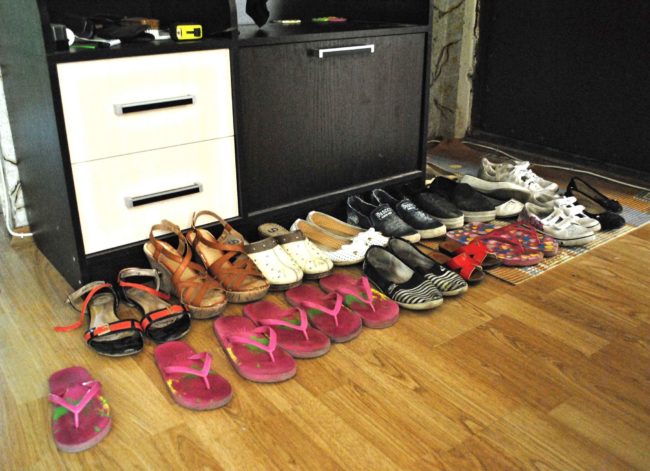
‘My girls were being prepared for the orphanage’
‘I often hear: “I am afraid I won’t be able to love a foster child as if it was mine”. I always answer that you shouldn’t compare. You don’t have to wait to have mad love for foster children; it will come later. You take them if you like children’, says Leyla.
‘I thought for a long time before I took in four sisters, all together. I didn’t know if I could manage at once with everyone. But I was really decisive and against separating sisters’.
‘At first it was really difficult with Elya. She was totally against going to a new family. Three families came to meet them before me. The Council on Guardianship [the agency responsible for children lacking parental guardianship] liked the third family, but Elya rejected them. According to law, older children like Elya (15) and Lilya (10) have the right to reject prospective parents. Angry, the staff of the Council decided that if this time Elya refused to go to the new family, the girls would be separated’.
‘When we came, Elya was against us as well. She didn’t even come to meet with us. However an employee from the Council on Guardianship told her that they would give me her sisters and she would be responsible for herself. She was used to being responsible for her sisters, but now she was in a situation where nothing depended of her. This was a shock for her’.
‘The girls came to the shelter in October 2016. According to law, if the children aren’t sent to families within 6 months they are sent to an orphanage. My girls were being prepared for the orphanage’.
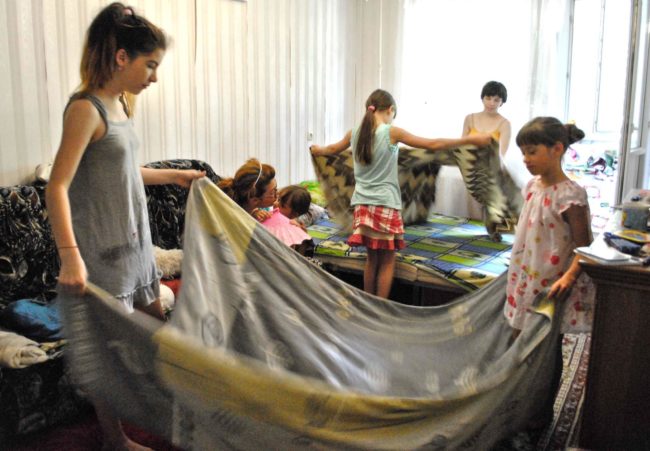
‘From the very beginning, I realized that Elya was not as prickly as she tried to seem. The two of us sat down to talk. I told her about the orphanage. “You understand”, I said, “you may ruin your whole life. You should see this as an opportunity”. She cried. Imagine you are being taken somewhere by strangers. To be honest, I cannot imagine how I myself would act in her place. I’m relieved there are a few of them. If there was only one child, their stress level would have been much higher’.
‘But I told the girls in the very beginning not to be scared, and if their parents would recover and would want them to return, I would not resist, I would let them go. After this, Elya and Lilya agreed’.
‘She is traumatised’
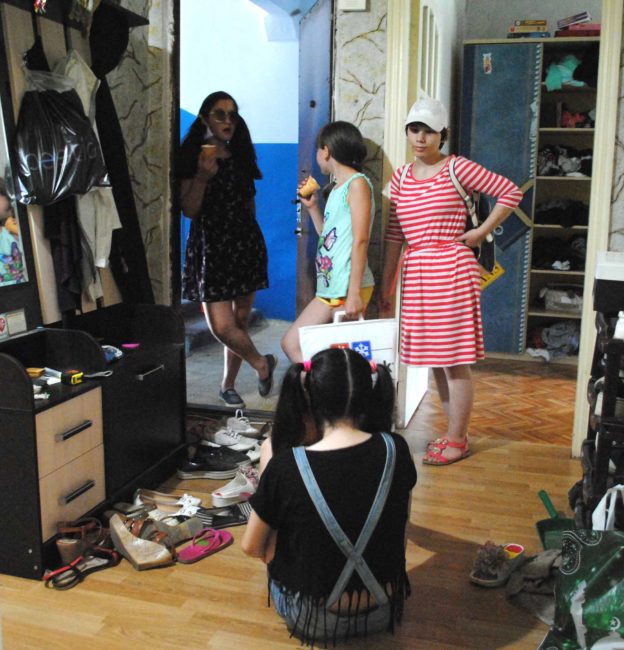
‘Milena immediately wanted to live with us. She was eight and she didn’t have the right to refuse anyway. She argued with her elder sisters, telling them that if they wouldn’t join, she would go with Adelka [the youngest sister]. When she saw Shakhri, she starting hugging her. She was telling the other girls in shelter: “this is my future sister”. She still talks with everyone. I'm not flattered by this tenderness. Milena has attachment disorder, this is an orphanage syndrome.’
‘I faced this syndrome when I took Marina. She almost immediately began calling me mother. In fact, [children with attachment disorder] reach out to everyone and to no one at the same time. They don’t have adult role models. Marina is a returned child. She had two mothers before me. If she will have ten more, she will call all of them mother.’
‘Some time after I took Marina I noticed that the neighbours were giving me strange looks. It turned out that Marina was complaining saying that I was beating her. However when I was with her, she would hug me and kiss me in the presence of the same women.’
‘She is traumatised. She had a hard time; I understand her behaviour. This is a way for a small child to elicit someone's support, protection, sympathy, even if these people are complete strangers. After all, she lives in a very fragile and volatile world, she has found and lost a family several times. How can she find her way now?’
‘Her major principle is the here and now. If she complains to a neighbour, they will pat on her head, give her chocolate, and buy her ice-cream. You need to use every way to get attention, treats, warmth, because tomorrow you could return to the shelter.’
‘Shakhri cannot understand this. She asks me how I can forgive her. I tell her: “I am a foster parent, this is my job”. I knew who I was taking. Of course I was not ready for this. However I knew that this child is from a shelter, she was returned, and there would definitely be some problems’.
‘I was offered to take another child who was returned, but I immediately rejected the offer. Being returned very much breaks down the psyche, I didn’t want to go through the same circle again. I am ready to take a child with any diagnosis, but not one who was returned. Even a healthy child’.
‘Shakhri quickly became friends with Elya. When we were going to Makhachkala from Samara I put them in a train compartment together. Seemingly they spent the whole night talking, getting to know each other. The next day Elya’s attitude was completely different. She was calm and happier’.
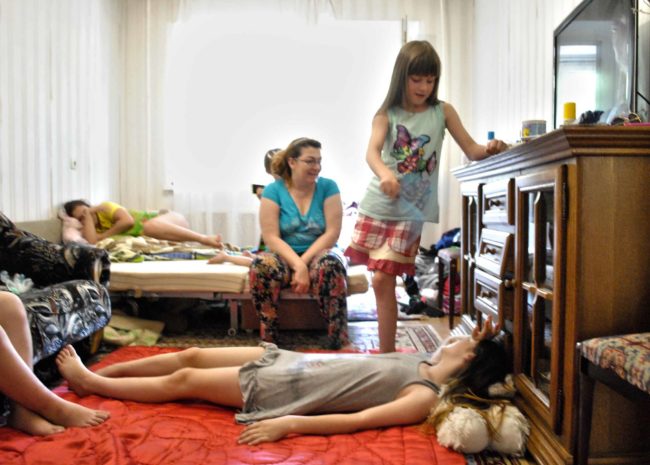
‘There is no assistance to foster families’
‘We decided to leave Daghestan because I cannot manage six children here. The situation in the country in terms of payments for foster children is not right. They pay ₽80,000 ($1,400) [per month] for one foster child in Moscow, while in Daghestan it’s only ₽7,000 ($120), but the workload is the same’.
‘I didn’t take in children for the money, but I have them now. Why won’t they help foster parents? The lack of material assistance is only one problem. There is another — there is no assistance to foster families at all. In many Russian cities there are different funds which assist foster parents.’
‘I met one family in Samara. They had foster children — a girl and two boys with cerebral palsy. There is fund which pays for the masseuse, another fund for another doctor and a third for a speech therapist. A psychologist works with the family for free and all of this is permanent.’
‘I visited them on 1 June [International Children’s Day] and I saw so many presents for the children and so many invitations to different children’s events. The mother didn’t even know which one to choose, where to take the children. It’s the third year I have had Marina. In all this time she hasn’t received anything from the government, no present, no invitation to any events.’
‘We are ordinary people’
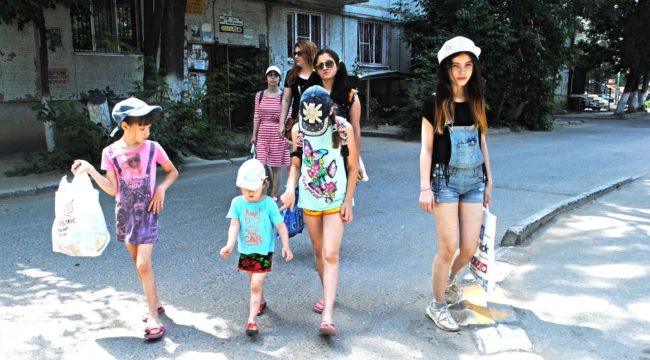
‘When Marina and I were still adapting to each other, the only thing that saved me was talking with a psychologist in Moscow. I found him myself. I surfed the internet, found him on forums, read stories from other foster parents, I’ve read so many books. Our law doesn’t include assisting foster parents or providing psychological assistance. You fight with the state for these children, you get them and then you are left with them and all the consequences alone. So I was helping myself independently, as much as I could.’
‘Now we are going through a sweet period with the new girls, but I am not flattered. I don’t think it will always be this easy. We still have to adaptat. Then it will be school problems. I know that it will be hard, this is why I want to have psychologists and social workers with us in this moment.’
‘Sometimes people call foster parents mercantile. But we are ordinary people. When I didn’t have foster children I used to count money back then too. Generally, when you have a family you start counting all your expenses — after having foster children it’s the same.’
‘Ever since I took Marina we have struggled with money. It’s good that people really helped us: they were giving us clothes, relatives gave us food. This is why I think the bias in cash payments is wrong’.
‘Maternity payments are the same for the entire country, there should be the same for foster children as well. Everyone has difficulties with children — in Moscow and in the regions as well. Every child is traumatised.’
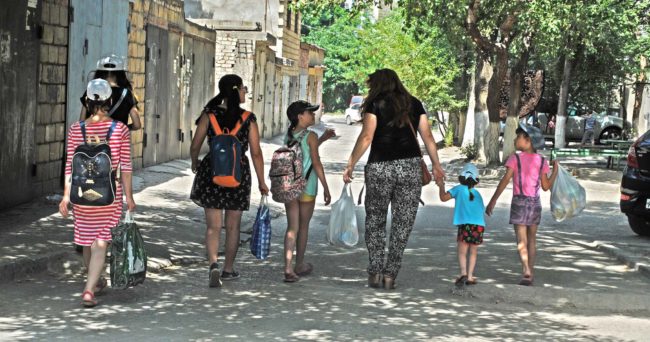
The article is a version of a partner post written by Aida Mirmaksumova. The original version first appeared on Daptar, on 16 September 2017.




 10 October 2017
10 October 2017
